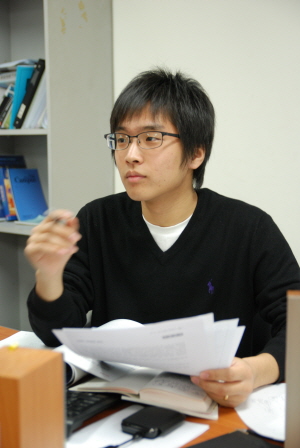With another academic year at KAIST coming to a close, a long-awaited news greets the KAIST student body; reduction in school fees. This is one of the results of the hard work from the 2010 KAIST Student Committee. With the completion of its term approaching, the president of the student committee Plus+ shares some thoughts about the past, present and future.

Can you briefly introduce yourself?
Hi, my name is Seung Park and I am a senior majoring in Nuclear and Quantum Engineering. Since December 2009, I have served as the president of KAIST’s 24th student committee, Plus+, for one year.
Could you explain more about the reduction in school fee policy?
The primary policy put forward by Plus+ was to lower the school fees and we are glad that it was a success. The reason why we decided to push this policy was because the students were experiencing too much pressure due to the immense school fees. Some pressure may be understandable, but too much will only cause distress. As this problem was not confronted by the former student committees, we decided to prioritize this issue over less major issues.
The new policy is that if a student fails to obtain scholarship, on the first instance he or she will pay only 50% of the school fees. On the second instance it will be 75% payment and from the third instance onwards, it will be full payment. If the student manages to obtain scholarship in between the periods, the count will reset. Also, if the student has to spend more than eight semesters at KAIST, the additional school fees will be proportional to the amount of credits being taken.
Although this policy is not the same as the school fees being taken out, I believe that it will take a lot of pressure off the shoulders of KAIST students.
Although it was a success, were there many difficulties on the way to this achievement?
I think the negotiation process was the most difficult. It was the first time that the student body came together to voice an opinion, so the school doubted that we could properly negotiate. As a result, it was hard to get opinions across at first. However, over time, as we started to meet and talk to the school more, the negotiation process improved and both sides came to understand each other better. Although what both sides are saying on the surface are contradicting, if we look deeper, the needs of both sides can establish a symbiotic relationship. The students want a happy campus life, while the school wishes to evolve into a better world-class university.
Can you tell us about the committee’s other achievements for this year?
There were a lot of things that we managed to achieve this year, so I’ll mention a few. Resting areas were established for female students, because we found out that some female students had difficulty studying in most of the places already available due to several reasons such as health. Also we established the “Apple on Campus” project which allows KAIST students to purchase Apple computer products for reduced prices. Most importantly, the biggest achievement I believe is that we managed to broaden the communications link between the student body and the school. Now we are able to participate in various committees regarding health, food and other areas to voice the opinions of students.
Now that your term is coming to a close, how do you feel?
To be honest, I don’t remember much about what I have done for the past year because the time went by so fast. Maybe it’s like the saying that if one becomes preoccupied with difficult tasks, one loses track of time. Now that everything is coming to an end, one part of me wants to wrap things up and have a rest. However, the other part is telling me to take responsibility and finish everything properly to the end. One thing I would like to do very much is to set up an evaluation committee to evaluate the 24th student committee and pass on some comments to the future student committees for reference.
Is there anything you would like to say to the 25th student committee?
The most important thing I would like to say is, do not concentrate only on the short-term policies and look ahead to some long-term policies, as the latter will have greater influence overall, even if it will not help as much with winning favor from the students. When I was running for election and even after I was voted, most people thought that reducing school fees would be an impossible task. However, we succeeded and this had the greatest impact on the students.
Do you have any last words for the KAIST student body?
I would like to say a big thank you to everyone for your support for the past year. It was a pleasure working as the voice of the student body. I would also like to ask from the students continued support and attention for the student committees in future years.

